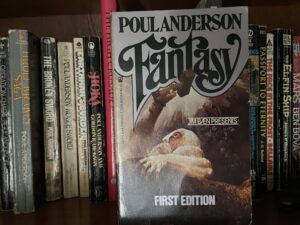
In 1981, Poul Anderson put out a collection of selections of his fantasy short stories, titled plainly enough Fantasy. Though perhaps that’s misleading, as not every entry is a fantasy short story, some being essays, some humorous oddities, and some defying the reader to apply classification. But that, I believe, was intentional in order to spotlight the breadth of the subject matter.
Is it any good? Well, of course. Poul Anderson wrote this stuff. Let’s take a deeper look. Advance warning: much of this I have read and reviewed before. Links abound.
House Rule. I am drawn to stories that take place in taverns. Taverns frequented by the fantastical or those time/dimension jumping taverns that are themselves fantastical, it doesn’t much matter. Callahan’s Crosstime Saloon. Gavagan’s Bar. Etc. The White Horse in Neil Gaiman’s Sandman offered a kindred drinking establishment to that in Anderson’s tale here. While I like House Rule, it is more of an anecdote than a complete story. Still, I’ll take what is poured until the bartender gets around to serving me again. (Which should be during A Midsummer Tempest, in my TBR pile.)
The Tale of Hauk. I wonder how many books I have reprinting this one. I reviewed it here.
Of PIGS and MEN. Tongue-in-cheek historical revisionism I previously reviewed here.
A Logical Conclusion. I remember liking this one when I reviewed it here. It holds up.
The Valor of Captain Varra. Always good to encounter one of the prototypical fantasy bards again. I reviewed it here.
The Gate of the Flying Knives. Revisiting Sanctuary after many years. And two of Sanctuary’s more anomalous, short-term denizens: Cappan Varra and Jaime the Red who both apparently return to their respective universes. A fun story, despite Cappan Varra feeling to me vaguely out of place in the stinking riot that is Sanctuary. He classes up the Vulgar Unicorn, which doesn’t seem quite right.
The Barbarian. Anderson has some fun with Robert E. Howard’s Hyborean Age conceit. Anderson is underrated as a humorist, subtly droll and tongue-in-cheek. He tells a sort of porto Groo the Wanderer story. Some REH readers might bristle, but I believe Anderson is poking gentle fun at the worst of the Clonans, rather than at the Ur-barbarian himself. Indeed, in the very next entry in this collection he writes “Howard could make Conan’s accession quite plausible.” (Page 166.) And Anderson wrote a Conan pastiche, Conan the Rebel.
On Thud and Blunder. Seminal, indispensable resource for writers of heroic fantasy. Reviewed here, though I honestly didn’t provide more than the written equivalent of a thumbs up. The thing is, if you write this sort of thing, Anderson has some advice for you. Good advice, if you want my opinion, though some of his observations should be considered in light of more current research (such as the quality of European swords.)
Interlopers. A fantasy-tinged science fiction story. The conceit is relatively easy to discern early on. Those who have read Broken Sword will pass through familiar territory. In some places it reflects Anderson’s early, less mature political philosophy. Overall, the weakest entry so far. Which still leaves it better than 90% of speculative fiction shorts.
Pact. A humorous riff on The Devil and Daniel Webster with a nod to Captain Stormfield’s Visit to Heaven. At its length, the story should have dragged. Bit it did not, Anderson skillfully keeping it light and zipping along.
Superstition. A post-apocalyptic fantasy about correlation and causation. Not bad, but not my favorite.
Fantasy in the Age of Science. An essay concerning the nature of fantasy (and science fiction, though primarily focused on the former) in the context of the (then) modern era. Anderson keeps if from becoming dryly academic and makes some trenchant points.
The Visitor. A poignant ghost story, dressed up with bookends of ESP and pseudo-scientific psychic phenomena. Poetic, elegiac.
Bullwinch’s Mythology. Amusing description of a mid-20th Century American pantheon of gods from the viewpoint of a mythologist writing millennia in the future.
Afterword. Worth reading, but unnecessary for appreciation of the collection.
Fantasy is a hefty, eclectic volume. It is one I should have picked up years ago. Well, I have a copy now. If you are feeling acquisitive, I suggest picking up something of mine. I think you’d enjoy the Semi-Autos and Sorcery series.

1 comment